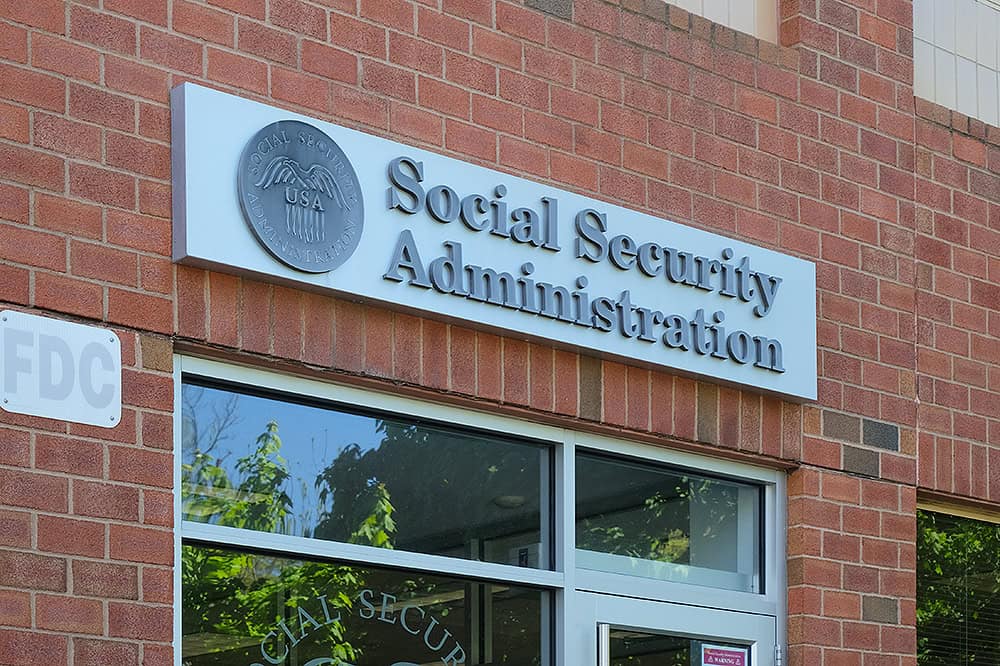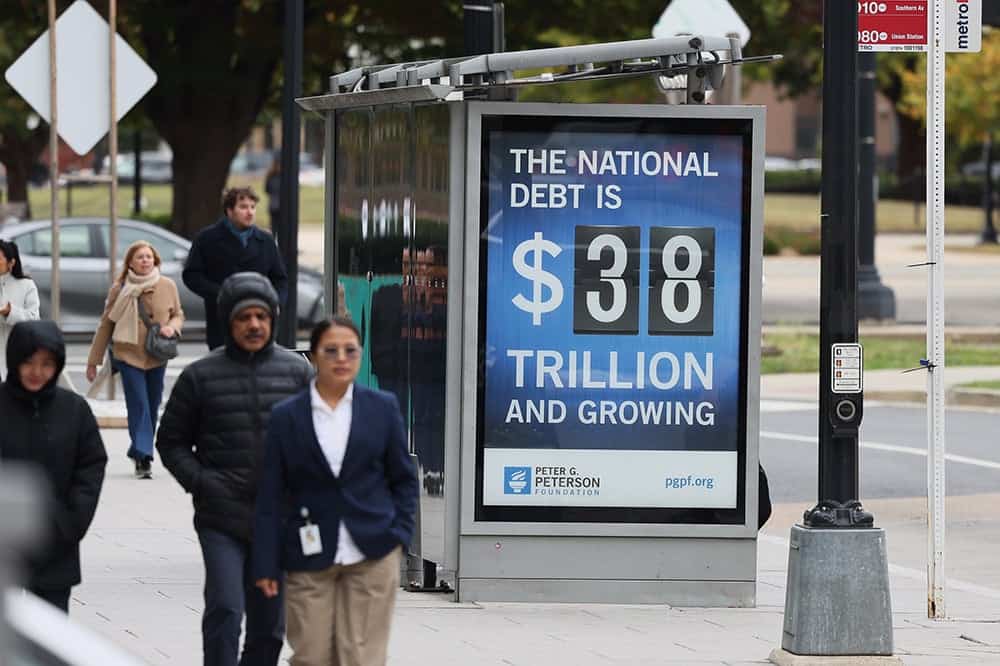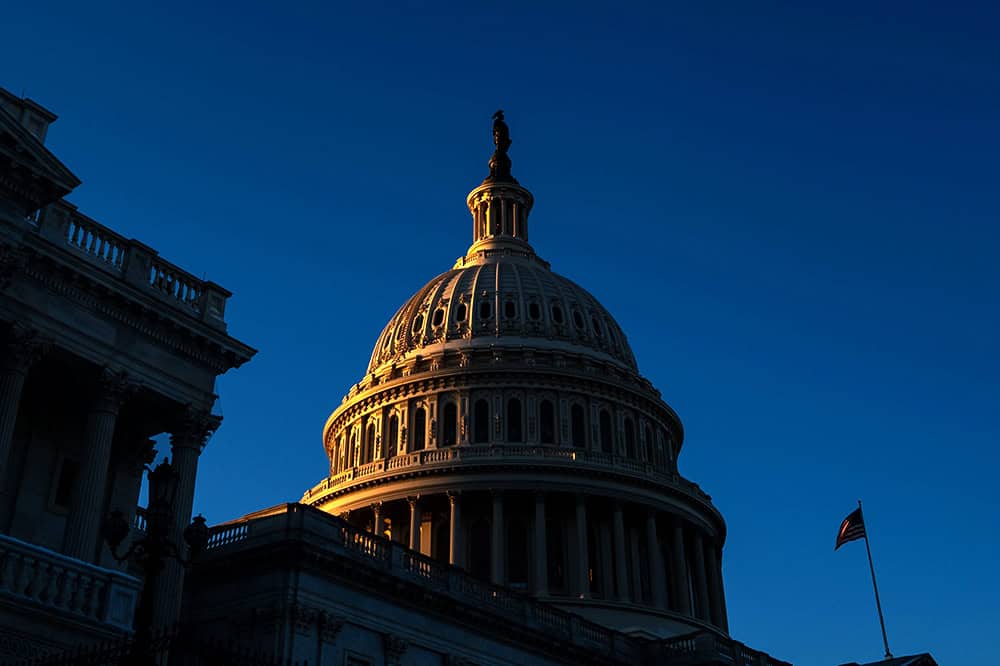Increase in Voter Concern about National Debt Reaches All-Time High as Budget Negotiations Continue
The October 2021 Fiscal Confidence Index, Modeled after the Consumer Confidence Index, is 45 (100 is Neutral)
NEW YORK (October 28, 2021) — As lawmakers continue to negotiate spending and revenue components of a multi-trillion-dollar legislative package, the increase in voter concern about the national debt has reached a record high, according to the Peter G. Peterson Foundation’s October Fiscal Confidence Index. The Index, modeled after the Consumer Confidence Index, is 45 (100 is neutral), reflecting the uncertainty and deep concern about whether and how the reconciliation package will be fully paid for as leaders in Congress and the administration have promised.
An all-time high of voters say that their concern about the national debt has increased, up five points from last month (83% increased/7% decreased). The previous high for this question occurred in January 2013 (81% increased/7% decreased). The Fiscal Confidence Index, jointly conducted by Democratic firm Global Strategy Group and Republican firm North Star Opinion Research, also shows that four in five voters feel the national debt should be a top-three priority for the president and Congress (79%), including 76% of Democrats, 75% of independents, and 85% of Republicans.
“This record level of voter concern about our national debt reinforces the urgent need for fiscal responsibility and should encourage lawmakers to fulfill their promise to fully fund new programs,” said Michael A. Peterson, CEO of the Peterson Foundation. “Importantly, support for paying for priorities spans across party lines, as voters see the opportunity to invest in America’s future while also acknowledging the threat that the debt poses to our economy. It is essential that leaders include credible budget offsets as part of a reconciliation package, and also look ahead to addressing the fundamental drivers of our unsustainable and harmful fiscal outlook.”
The deep voter concern about our fiscal trajectory is consistent with recent polling showing significant support for a fully paid for reconciliation package. For example, 91% of voters, including 90% of Democrats and 94% of Republicans, want leaders to fully fund the budget bill with credible offsets. Strong majorities of voters support several revenue raising options on the table to make that happen.
The Fiscal Confidence Index measures public opinion about the national debt by asking six questions in three key areas:
- CONCERN: Level of concern and views about the direction of the national debt.
- PRIORITY: How high a priority addressing the debt should be for elected leaders.
- EXPECTATIONS: Expectations about whether the debt situation will get better or worse in the next few years.
The survey results from these three areas are weighted equally and averaged to produce the Fiscal Confidence Index value. The Fiscal Confidence Index, like the Consumer Confidence Index, is indexed on a scale of 0 to 200, with a neutral midpoint of 100. A reading above 100 indicates positive sentiment. A reading below 100 indicates negative sentiment.
Fiscal Confidence Index Key Data Points:
- The October 2021 Fiscal Confidence Index value is 45. (The September value was 43. The August value was 43.)
- The current Fiscal Confidence Index score for CONCERN about the debt is 42, indicating deep concern about the debt. The score for debt as a PRIORITY that leaders must address is 25, indicating that Americans want elected leaders to make addressing long-term debt a high priority. The score for EXPECTATIONS about progress on the debt is 69. The Fiscal Confidence Index is the average of these three sub-category scores.
- For a description of the complete methodology, see the Appendix below.
The Peter G. Peterson Foundation commissioned this poll by the Global Strategy Group and North Star Opinion Research to survey public opinion on the national debt. The online poll included 1,000 registered voters nationwide, surveyed between October 18, 2021 and October 20, 2021. The poll has a margin of error of +/- 3.1%. The poll examined voters’ opinions on the national debt, political leadership, and America’s fiscal and economic health.
Detailed poll results can be found online at: www.pgpf.org/FiscalConfidenceIndex.
About the Peter G. Peterson Foundation
The Peter G. Peterson Foundation is a nonprofit, nonpartisan organization that is dedicated to increasing public awareness of the nature and urgency of key fiscal challenges threatening America’s future, and to accelerating action on them. To address these challenges successfully, we work to bring Americans together to find and implement sensible, long-term solutions that transcend age, party lines and ideological divides in order to achieve real results. To learn more, please visit www.pgpf.org.
APPENDIX: Fiscal Confidence Index Methodology and Questions
- The Fiscal Confidence Index is released monthly by the Peter G. Peterson Foundation.
- The Fiscal Confidence Index value is based on six questions in three categories.
- As is done with the Consumer Confidence Index, the first step in calculating the Fiscal Confidence Index is determining the “Relative Value” for each question. This calculation is made by taking the positive response for each question and dividing it by the sum of the positive and negative responses. Each question was asked on a four-point scale, and answers were weighted according to intensity, with the strongest responses counting twice as much as the middle responses (“much” better or worse answers count twice as heavily as “somewhat” better or worse answers).
- The scores for the Concern, Priority, and Expectations categories are determined by averaging the scores derived from the two questions in each category.
- The Fiscal Confidence Index value is converted from the Relative Value to place it on a scale on which 100 indicates equal positive and negative sentiment, while values below 100 indicate negative sentiment and values above 100 indicate positive sentiment.
- The questions are as follows:
| CONCERN (42) | |||
|---|---|---|---|
| Thinking about our national debt over the last few years, would you say your level of concern has increased or decreased? ◊ Is that a lot or just a little? |
October 2021 | September 2021 | August 2021 |
| Increased a lot | 55% | 50% | 55% |
| Increased a little | 27% | 29% | 27% |
| Decreased a little | 4% | 5% | 5% |
| Decreased a lot | 4% | 3% | 3% |
| (No change) | 6% | 9% | 7% |
| (Don’t Know/Refused) | 4% | 3% | 4% |
| INCREASED (NET) | 83% | 79% | 81% |
| DECREASED (NET) | 7% | 8% | 8% |
| When it comes to addressing our national debt, would you say things in the United States are heading in the right direction or do you think things are off on the wrong track? ◊ Do you feel that way strongly or just somewhat? |
October 2021 | September 2021 | August 2021 |
| Right direction — Strongly | 15% | 14% | 13% |
| Right direction — Somewhat | 21% | 22% | 22% |
| Wrong track — Somewhat | 22% | 22% | 23% |
| Wrong track — Strongly | 37% | 37% | 36% |
| (Neither/Mixed) | *% | 1% | 1% |
| (Don’t Know/Refused) | 4% | 5% | 5% |
| RIGHT DIRECTION (NET) | 36% | 35% | 35% |
| WRONG TRACK (NET) | 59% | 59% | 59% |
| PRIORITY (25) | |||
|---|---|---|---|
| Some people say that addressing the national debt should be among the president and Congress’ top 3 priorities. Do you agree or disagree? ◊ Do you feel that way strongly or just somewhat? |
October 2021 | September 2021 | August 2021 |
| Strongly agree | 55% | 52% | 49% |
| Somewhat agree | 24% | 25% | 25% |
| Somewhat disagree | 11% | 12% | 13% |
| Strongly disagree | 6% | 6% | 7% |
| (Don’t Know/Refused) | 5% | 5% | 6% |
| AGREE (NET) | 79% | 77% | 74% |
| DISAGREE (NET) | 16% | 18% | 20% |
| And when it comes to our national debt, do you think it is an issue that the president and Congress should spend more time addressing or less time addressing? ◊ Would you say a lot (more or less) time or just a little? |
October 2021 | September 2021 | August 2021 |
| A lot more time | 55% | 50% | 49% |
| A little more time | 27% | 32% | 30% |
| A little less time | 8% | 6% | 7% |
| A lot less time | 4% | 5% | 6% |
| (The same amount of time) | 3% | 3% | 3% |
| (Don’t Know/Refused) | 4% | 5% | 5% |
| MORE TIME (NET) | 82% | 81% | 80% |
| LESS TIME (NET) | 12% | 11% | 12% |
| EXPECTATIONS (69) | |||
|---|---|---|---|
| And thinking about our national debt over the next few years, do you expect the problem to get better or worse? ◊ Is that much (better or worse) or just somewhat (better or worse)? |
October 2021 | September 2021 | August 2021 |
| Much better | 13% | 10% | 8% |
| Somewhat better | 17% | 14% | 16% |
| Somewhat worse | 26% | 31% | 29% |
| Much worse | 40% | 38% | 41% |
| (No change) | 2% | 3% | 2% |
| (Don’t know/Refused) | 4% | 5% | 4% |
| BETTER (NET) | 30% | 24% | 24% |
| WORSE (NET) | 65% | 69% | 70% |
| And when it comes to our national debt, are you optimistic or pessimistic that the United States will be able to make progress on our national debt over the next few years? ◊ Would you say you are very (optimistic or pessimistic) or just somewhat? |
October 2021 | September 2021 | August 2021 |
| Very optimistic | 11% | 8% | 8% |
| Somewhat optimistic | 31% | 30% | 31% |
| Somewhat pessimistic | 28% | 30% | 31% |
| Very pessimistic | 25% | 26% | 25% |
| (Neither/Mixed) | 2% | 2% | 2% |
| (Don’t Know/Refused) | 3% | 4% | 4% |
| OPTIMISTIC (NET) | 42% | 38% | 38% |
| PESSIMISTIC (NET) | 53% | 56% | 56% |
Further Reading
Lawmakers are Running Out of Time to Fix Social Security
Without reform, Social Security could be depleted as early as 2032, with automatic cuts for beneficiaries.
What Is the National Debt Costing Us?
Programs that millions of Americans depend on and care about may be feeling a squeeze from interest costs on our high and rising national debt.
Interest Costs on the National Debt Are Reaching All-Time Highs
The most recent CBO projections confirm once again that America’s fiscal outlook is on an unsustainable path — increasingly driven by higher interest costs.


